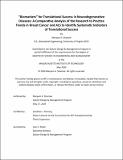“Biomarkers” for Translational Success in Neurodegenerative Diseases: A Comparative Analysis of the Research to Practice Trends in Breast Cancer and ALS to Identify Systematic Indicators of Translational Success
Author(s)
Shamsie, Maryam A.
DownloadThesis PDF (2.197Mb)
Advisor
Fleming, Jonathan J.
Terms of use
Metadata
Show full item recordAbstract
Translating research findings into practical therapies for neurodegenerative diseases remains a formidable challenge in biomedical research. This challenge arises from the diseases’ inherent heterogeneity and complexity. Interestingly, similar obstacles were historically encountered in breast cancer research, which has since made significant strides in treatment effectiveness. To address this research-practice gap for neurodegenerative diseases, this research proposes identifying key indicators that can be used to estimate and prioritize research efforts, ultimately improving the success rate of translation to clinical practice. A literature review and principles of systems architecture and dependencies were used to qualitatively assess key indicators and their impacts on successful translation. By comparing the history of research and translation between breast cancer and Amyotrophic Lateral Sclerosis (ALS), we identified eight critical indicators for successful translation in heterogeneous diseases. Among these, two stand out: (1) the identification of critical molecular pathways relevant to the disease and (2) the corresponding biomarkers. Discoveries of these two indicators for a particular disease can pave the way for a precision medicine approach, bridging the gap between research and practical applications of therapies for complex illnesses.
Date issued
2024-05Department
System Design and Management Program.Publisher
Massachusetts Institute of Technology